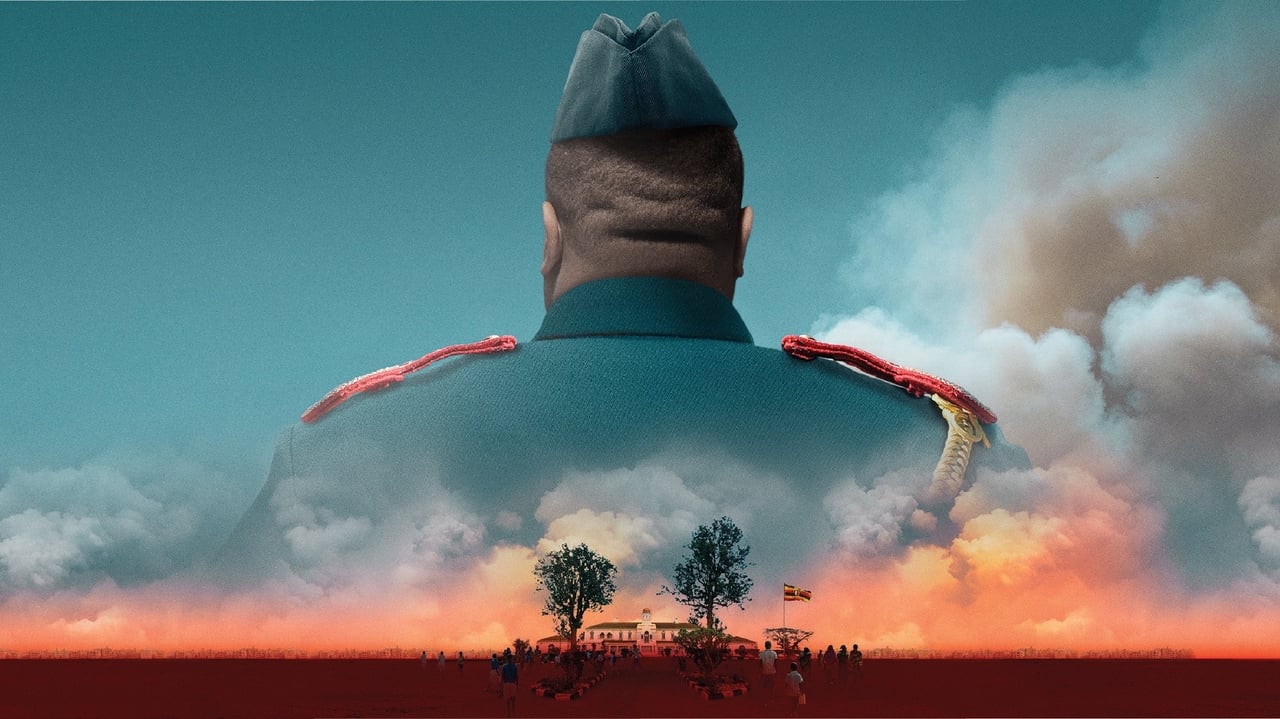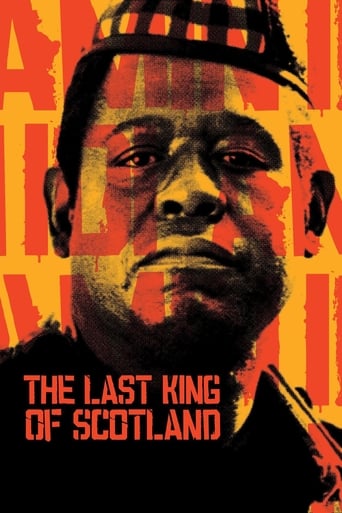



Boring
I gave this film a 9 out of 10, because it was exactly what I expected it to be.
View MoreIf you're interested in the topic at hand, you should just watch it and judge yourself because the reviews have gone very biased by people that didn't even watch it and just hate (or love) the creator. I liked it, it was well written, narrated, and directed and it was about a topic that interests me.
View MoreIt's a good bad... and worth a popcorn matinée. While it's easy to lament what could have been...
View MoreTry to imagine what it might be like if you were a Western European and witnessed—from the inside--the beginning and development of one of the most notoriously brutal African dictators of the 20th Century. What might it have looked like to you? This is exactly what Giles Foden did when he wrote his fictionalized historical novel, The Last King of Scotland. In writing his novel, Foden gives us a chance to try to get into the regime of Ugandan dictator Idi Amin and get an up close and personal look at this brutal clownish figure from the 1970s. Like Hitler or Jim Jones, there is a curiosity to know more about where such people come from and what makes them tick. Call it morbid, but nevertheless, it is still there. In the movie version of the novel, Scottish director Kevin Macdonald--principally known for his documentary, Touching the Void (2003)--shapes Foden's novel and brings it to life.As the movie opens c.1970, a young Scottish doctor, Nicholas Garrigan (James McAvoy), is fresh out of medical school but feels that he will always live in his father's shadow unless he breaks from the family and practices medicine far away. Seeking to make a difference, he chooses to practice in the underdeveloped African country of Uganda. Nicholas starts to work in a free clinic with another white doctor and his wife, Sarah Merrit (Gillian Anderson). When he hears about a local coup, he thinks it would be interesting to go to town and see a rally with the new leader. Nicholas and Sarah go to the planned demonstration where they see Idi Amin (Forest Whitaker) addressing a large crowd. On their way back to the clinic, he is stopped on the road by the local authorities because Amin is in need of medical help. While he is treating Amin's injured hand, the two make a connection. Amin becomes interested in the way Nicholas handles himself and admires Nicholas' tee-shirt with the word, "Scotland" on it. He wants to trade his uniform for Nicholas' tee-shirt. The fact that both identify with the Scots and dislike the English is something they have in common.Shortly thereafter, Amin sends his limo to pick up Nicholas, gives him a tour of his palace, and meets his wives and children. Then, in a jovial way, he asks him to become his personal doctor, and offers to let him run Uganda's top clinic in Kampala. Nicholas accepts and abruptly leaves the clinic. As he enters into Amin's social functions and is taken into Amin's confidence, Amin starts to call him 'his personal adviser.' Nicholas' naivete is no match for Amin's charm, and he is soon ensnared into Amin's inner circle. Soon, British agents are asking Nichols to 'keep in touch' if there in anything that they should know; Nichols scoffs at the idea of informing on Amin.As Amin's personal doctor, Nicholas notices his growing paranoia. But, living in a somewhat cloistered life, Nicholas doesn't realize the brutality of what is going on in the country. It's only when he is personally degraded that he discovers some of Amin's atrocities. And, it is only when he becomes the object of that brutality—as a result of an affair with one of Amin's many wives--that he personally experiences it.What's amazing to me about this movie is that—until the very end—there is little violence to portend what is really happening in the country. We know—though Nicholas' eyes---that Amin is concerned about his world image. We know that he is negotiating about Palestinian and Israeli hostages from a hijacked airplane. But, the movie only skims the surface of these important historical issues, because that is not really what the movie is about. It's about the relationship between a naive personal adviser (later called a 'personal monkey') and the web of deceit spun by the brutal sociopath that controls him.'The death toll during Amin's regime will never be accurately known. An estimate from the International Commission of Jurists is that it was not less than 80,000, and more likely around 300,000. Another estimate, compiled by exile organizations with the help of Amnesty International, put the number killed at 500,000.'--Quoted from WikipediaIt's important to note that the time frame of this fictionalized story is from 1971 to the incident at Entebbe in 1976, and Amin's regime was to last until he was deposed in 1979. What we really don't know--and can't know from the above quote--is the time pattern of Amin's ordered tortures and killings: What would a time chart would look like, with TIME as the X-Axis and KILLINGS AND TORTURES as the Y-Axis? From this chart you could see: 1) Did these killings and tortures start gradually and grow over time? 2) Did they occur at a constant rate throughout his regime? 3) Were they concentrated more in the later years of his rule? 4) Were there any external events that triggered when they occurred?Since we can only estimate the raw numbers, we are even FURTHER afield as to the pattern of their occurrence. When you factor in that we are seeing a fictional account of Amin though the eyes of a cloistered and naive white Western European, what you are left with is a story of what might have happened. Again, I say that the movie and novel are more about the relationship between Garrigan and Amin than what I suggested at the beginning of the review: the witness and experience—from the inside--of Amin's entire regime.Does this movie give us more insight into the mind or motives of Amin? Probably not. But, Forest Whitaker gives us a powerful portrayal of this historic figure. Whitaker could have overplayed Amin, but he didn't. His portrayal seems right on the mark!!
View MoreBased on true events, this film depicts the life and personality of Ugandan dictator Idi Amin. Directed by Kevin Macdonald, this film has a screenplay by Jeremy Brock and Peter Morgan. The cast is led by Forest Whitaker and James McAvoy.This film portrays, mostly, real facts which are part of the dark side of the history of a young African country: Uganda. Idi Amin led the country with an iron fist, not hesitating to kill all potential opponents. Despite all the cast have played their role with great quality, Whitaker deserves mention: he knew perfectly incorporate the several facets of this highly contradictory historical character: in some moments, his thought and personality can seem very positive but, as the film is rolling, the audience increasingly contacts with the darker side of a deeply paranoid personality, worthy of a Caligula. Whitaker was truly intimidating, and the staff of characterization and costume managed to complete his work by giving him a strong physical resemblance to the real dictator. So its not surprising that Whitaker has won (with merit) the Oscar for Best Leading Actor. But be friend with someone like Amin means walking on the edge of a knife and too close to death. The character of McAvoy, a young idealistic and naive doctor from Scotland who went to Africa in search of adventure, shows us these dangers, and its delightful to see his mind awakening to the problems of that country, while contacting directly with the madness of his new African friend.Visual, special and sound effects were very good, especially in the most stunning scenes, and scenarios easily transport us to Africa. The script, in turn, is quite consistent and realistic, not falling into exaggeration nor blistering action scenes. Everything went as it should, everything was done in the correct measure.
View MoreDirector Kevin Macdonald dives headfirst into a committed style of Hollywood documentary visual style. Something that he is comfortable with as seen in "One Day in September" and "Touching the Void. " McAvoy's boyish acting enhances Garrigan's apolitical foolishness and naivety. It reminds me of the Shakespearean style of story in relation to the doctor's catastrophic failings. On a dramatization note, The acting by Forest Whitaker was exceptional and well deserved for an Oscar. He is astoundingly multifaceted and convincing in his role and you can always feel the emotional response on screen, in real life. I think it carried well and although it was well done there were some unneeded sexual scenes that seemed to have little to no relevance and reason to be in the film. The reason i titled it unexceptional was because there was a sense of amateur production that was carried by the acting and story line. It didn't have the whole picture and even the story didn't unravel with completely conclusive results. Overall, I probably wouldn't watch this again. I would like to see maybe the same story line but done much more seriously.
View MoreThe movie takes on one of the most notorious true story of the Ugandan Iddi Amin. Yet the movie is too confined on the point of view of Nicholas, so the movie didn't really explore enough on Amin's notoriety. Yes, Forest Whitaker's acting did greatly in building up the character for this movie. But that character wasn't quite portrayed evenly due to the heavy focus from Nicholas' point of View, which kind of balanced the charm and intimidation Amin had. Yet the truth of ruthlessness wasn't really covered, since the actual ruthless side the president wasn't depicted in the movie. Yet as I said earlier the acting overall is a very good one, all thanks to Forest Whitaker's performance in giving live to the character, despite the imbalanced depiction of the ruthlessness. James MacAvoy did quite good in playing the confused doctor.
View More